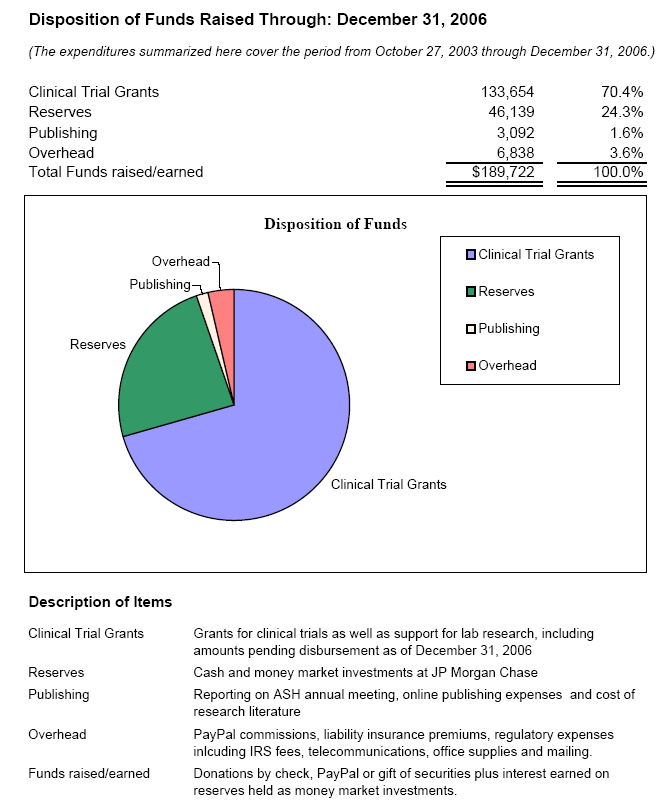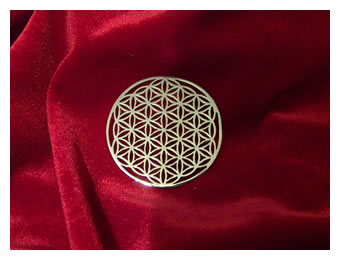 |
||||||||||
Updated: July 18, 2025
by P. C. & Chaya Venkat

With the help of our very supportive Board of Directors, we have been at work on this subject for a while. So we thought we would share with you the thought process behind our involvement in supporting and, we hope, making a difference in the direction of research in CLL therapies. You should be interested — we are talking about spending your money. Here is a chart showing what we have done with the money raised so far - it should be clear that almost all the funds go to supporting clinical research in CLL.

You can read about the projects we have sponsored so far by using this link: Sponsored Projects.
Here are the key philosophical issues driving our effort. These statements are not hard-and-fast criteria for a YES/NO selection but serve more as a set of guiding principles behind our conversations with the investigators who are doing the actual research work in labs and clinics.
The above principles apply surprisingly well to the CLL Topics sponsored projects to date:
It is an attitude completely at variance with the big-stakes game afoot in the biotech world. Commercial sponsorship has seriously sculpted the nature of scientific investigation into cancer therapies. Some of this is positive: we now have remarkably well-targeted and effective agents that we would never have had without the big bucks that the biotech corporate world and Wall Street bring to the party. But much needs to be done to determine the best way to use these technologies for each individual patient. And there are some wonderful low-hanging fruit that can be of immense value in adding to the quantity and quality of life of the patients in our community. The commercial dollars will follow the path of greatest return in the stock market and biggest executive bonuses. We would like to devote a small stream of resources to the achievement of well-targeted victories for patient communities that can add to life and quality of life without costing an arm and a leg or necessarily making the heavy hitters' league in corporate compensation or the stock market. We certainly do not want to feed the speculative drive that leads to high-risk clinical trials with human subjects solely based on high potential commercial reward. We like low-risk and low cost and, failing that, perhaps low risk, moderate cost and highly targeted effectiveness.
We all have to face the extraordinary and rapidly escalating costs of our health care system. This concerns each one of us personally. Regardless of individual role, each of us will have to make unpalatable choices caused by high costs. Patients with chronic diseases pay every which way: medical insurance premiums, costs of prescription drugs, taxes and the hidden cost of rationing, delays and ethical failures. Not to mention doing without if the poor unfortunate has no access to medical services unless he or she is willing to sacrifice the proverbial arm and leg. Americans, we are told, have to work through April 18 every year, or some such ridiculous date, just to pay the tax man. If we add in the costs of supporting the medical establishment, perhaps we are into the second half of the year — or may soon be, to achieve tax-and-medical freedom. And then we can devote our resources to the art of living. Our members from the rest of the world doubtless face similar hard facts, if not worse. CLL patients with their chronic life-threatening condition, are very vulnerable in this regard. It is indeed thus: your money or your life.
The great bulk of our fundraising is from individual donors, many on limited incomes. They send in their donations despite a lack of any compulsion. All our services are free and all donations are purely voluntary. We stay away from employing Jedi mind tricks or even liberal guilt. The simple driving force that gets these projects off the starting block is the moral weight of patients putting their money where their hearts are.
We hope we can. There is now some evidence we can get at least part way to our goal of getting projects off the ground. For reported results we will have to wait a bit longer. Please see our Sponsored Projects page for some of this evidence. As a relatively new phenomenon in the game, we readily admit that the role we are seeking to play does make the game more complicated for the established players. But perhaps also more interesting.
We are grateful to all our donors and members for their part in this and, of course, for us they are the key to getting things done. They are the dedicated students that participate in our patient education mission. They are the activists who bring new developments to the attention of their doctors, serving to provide CME, continuing medical education, through an unusual route. They are the donors who send in their hard-earned money because they agree that what we do is worthwhile. Above all, they are the brave participants in human clinical trials to validate new therapies. We never underestimate the contribution to posterity that clinical trial participants make, many in trials from which they cannot expect personal therapeutic benefit. They are the reason why one part of our huge health-care industry even exists, why research goes on in hospitals, universities and commercial labs. It is our privilege to bring their point of view and their priorities to the people in the research labs and help close the two-way information loop with the professional medical establishment. We hope to do this in a way that helps all the participants — and we think we do. However, our viewpoint is that of the patient: since ultimately, patients' opinions and priorities, needs and wants must count in this game. As patients, we do pay for it all: and for that reason have a clear responsibility to make ourselves heard. Unless you'd rather pay the piper every time and not call the tune, at least occasionally?
We must also gratefully acknowledge the smart scientists and CLL specialists who are constantly juggling interesting ideas and, in our experience, are increasingly coming out of their shells to talk about their concepts. Many are intrigued by workable suggestions, even if they come from an unexpected quarter such as CLL Topics. We are constantly encouraged by the extraordinary qualities of imagination and enterprise evident in the research being done today, in spite of a difficult, sometimes inimical, government funding environment for many areas of research. This is an exciting time for research in immunology and cancer biology and we have some very smart people doing the job. We wish to help them directly, in our own way.
The physicians and clinicians we have come to respect and depend on play a central but difficult role in keeping abreast of all the changes that are happening at rapid-fire pace. But they are indeed where the rubber meets the road. A caring physician is worth more than his or her weight in gold. We hope to put some good tools in the hands of these professionals through the research we sponsor, or at the least, arm them with some important insights. In addition to, of course, providing them with better educated patients on the tightly focused topic of CLL.
When you send in your hard earned dollars to support our efforts, perhaps these philosophical guidelines will help you understand why we are asking for your support.
 Enter Keywords: |
———
Disclaimer: The content of this website is intended for information only and is NOT meant to be medical advice. Please be sure to consult and follow the advice of your doctors on all medical matters.
Copyright Notice:
Copyright © 2025-2007 CLL Topics, Inc. All Rights Reserved.
All materials contained on this site are protected by United States copyright law and may not be reproduced, distributed, transmitted, displayed, published or broadcast without the prior written permission of CLL Topics, Inc. You may not alter or remove any trademark, copyright or other notice from copies of the content.
However, you may download and print material from CLLTopics.org exclusively for your personal, noncommercial use.
———
